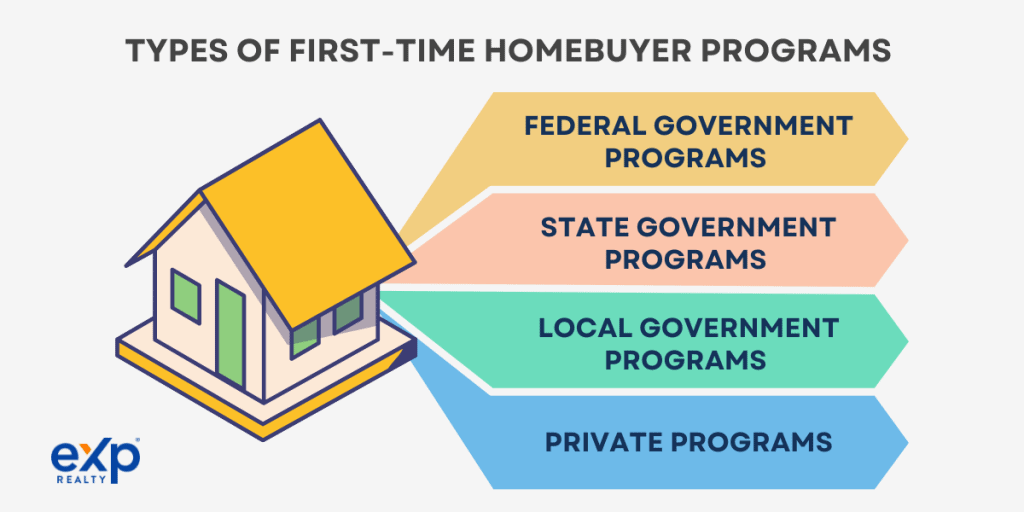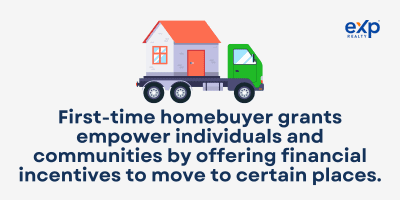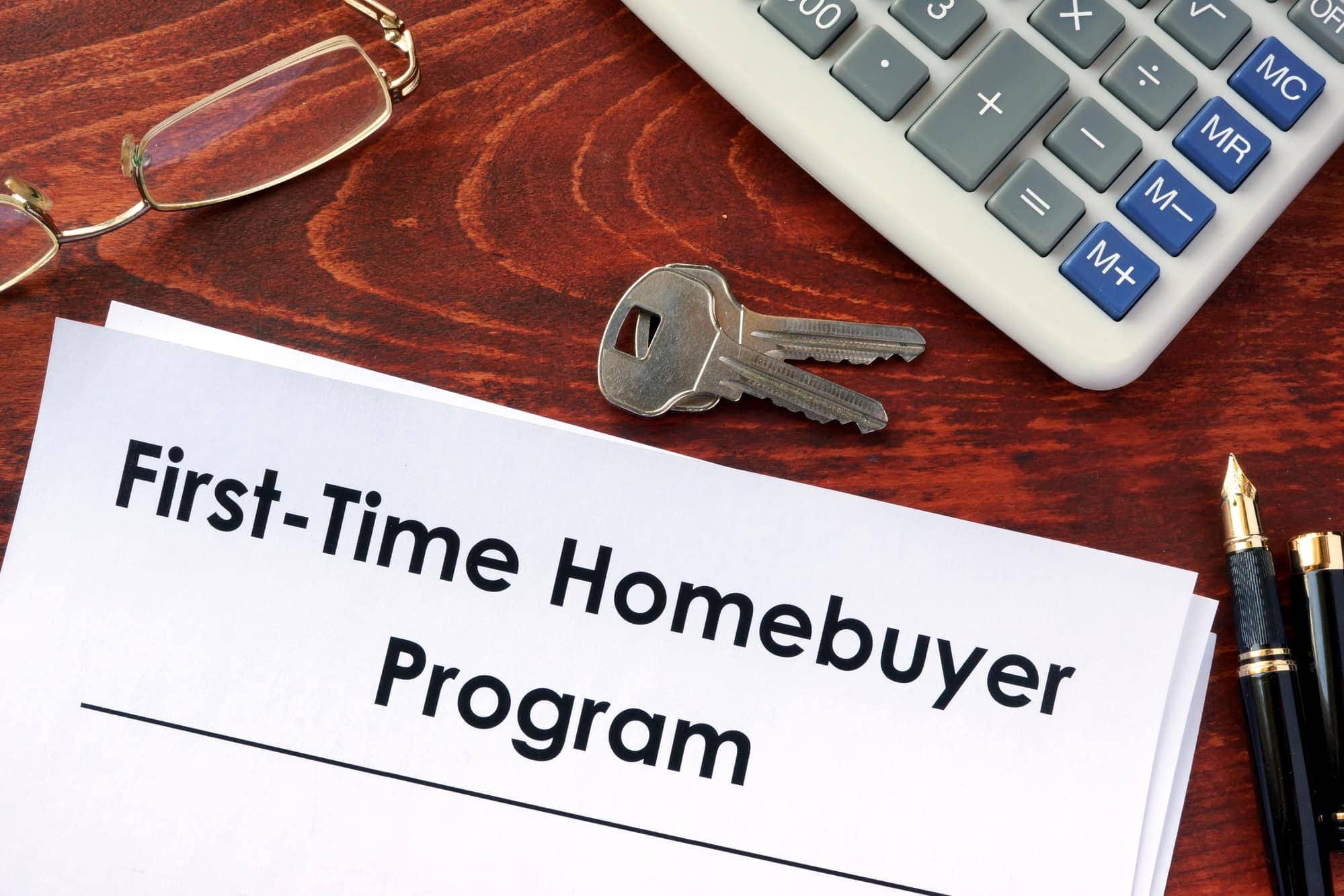Purchasing your first home can be a stressful experience.
From finding the perfect property to gathering all the necessary funds, the process requires research and diligence.
Homebuying seems only to become progressively more out of reach as prices rise. According to the National Association of Realtors’ yearly demographics report, the share of first-time home buyers is lower than ever since many young people cannot afford to buy property.
Thankfully, many first-time homebuyer programs, loans, and grants can be accessed by young prospective homeowners. These options are one of the main things that every first time home buyer should know.
If you’re one of the millions of people looking to buy their first home, use this guide to find the best payment assistance program for you.
Types of first-time homebuyer programs
First-time homebuyer programs are financial aid packages that assist young singles, couples, or families seeking to acquire complete homeownership.
Programs include mortgage rate reductions, sponsorships, down payment and closing cost assistance programs, and tax credits.
The main types of first-time home buyer programs include federal government programs, state-run programs, local programs, and private programs.

Read on for more details about each program.
Federal government programs
Federal government programs for first-time homebuyers are financial incentives provided by the federal government and disbursed nationally.
Common homeownership programs include
- Grants and Loans (detailed below)
- FHFA First-Time Home Buyer Mortgage Rate Discounts: These discounts are available to household incomes at or below the area’s average income and consist of 2% discounts.
- Low and No Down Payment Mortgages: These programs offer 3% down payments for those who qualify based on credit scores (roughly 600-650)
- Discounted Homes from HUD: These homes are generally available to public servants who want to live in the communities they serve.
- First-Time Home Buyer Tax Credits: The IRS may grant credits to first-time homebuyers.
There are several other federal incentive programs. Additionally, the federal government provides several loans and grants.
State government programs
Most states also offer their first-time homebuyer programs.
The Department of Housing and Urban Development provides a comprehensive list of homeownership programs by the state on its website.
You can simply click on a state to learn more about state programs, grants, and loans.
State programs include
- Grants & Loans (detailed below)
- Down Payment Assistance Programs (DPA), including deferred mortgage options and down payment loans.
- Forgivable Mortgages: States may allot forgivable mortgages to encourage people to move.
- Affordable Financing Options: Additional options are available to those seeking to finance or refinance homes.
Some states offer tax credits or alternative financial incentives for first-time home buyers.
Local government programs
Many local government programs can help you buy your first house. Some neighborhoods offer tax credits or breaks for new homeowners, but most local programs consist of cash grants.
Many closing cost assistance programs operate in certain municipalities.
Most local programs have specific requirements in place for their homebuyers’ incentives. For example, you may have to work in a particular industry or earn a certain amount.
You can determine whether or not you qualify—and find out more about local programs—on your municipality’s government website.
Private programs
Many nonprofits and independent organizations offer first-time home buyer programs.
For example, a small nonprofit may sponsor your down payment or cover closing costs for applicants who meet specific criteria.
Most private programs prioritize specific buyers, so you’ll have to research each program before applying.
There are also programs provided by Freddie Mac and Fannie Mae, the government-backed third-party companies that back mortgages.
What is a first-time buyer loan?

First-time buyer loans are provided to new and prospective homeowners to assist in acquiring and financing their homes.
Interestingly, the government defines a first-time home buyer as someone who hasn’t owned their primary residence in the last three years. By this definition, even those who have previously owned a home may qualify.
There are many excellent first-time homebuyer programs; some are easy to apply for and receive.
Why are first-time buyer loans necessary?
First-time buyer loans enrich local communities and benefit the nation as a whole.
Homeowners are more likely to contribute to their communities by paying taxes, helping to grow up-and-coming neighborhoods, local funding for schools, and more.
Additionally, people who own their homes have more purchasing power and can thus contribute to the national and global economy.
The government is vested in providing first-time buyer loans, and it can help many people access homeownership without breaking the bank.
Loans for first-time homebuyers
There are several different loans available to first-time home buyers. Please remember that most loans have certain restrictions based on income, credit score, demographics, and more. Each loan is different, so consider the requirements before applying.
FHA loans
Three government-backed loan programs exist: FHA, VA, and USDA loans.
The Federal Housing Administration offers FHA loans, which are insured and protected by the FHA. The FHA commonly awards mortgage loans.
These loans are typically available with low down payment options and lower minimum credit scores. They often require applicants to obtain mortgage insurance.
Although FHA loans are not strictly limited to first-time home buyers, they are adaptive to the needs of novice homeowners because they offer the following:
- Down payments as low as 3.5% of the purchase price
- Low credit requirements
- Low closing costs
- Additional help for seniors
To complete an application:
- You can consider only FHA-approved homes
- Your new home must be your primary residence
- You have to move in within 60 days of the closing
- You must obtain an inspection
- Your mortgage payment shouldn’t exceed 31% of your monthly gross income, and your debt-to-income ratio cannot exceed 43% of your monthly gross income (unless you have a high credit score).
VA loans
VA loans are incredibly advantageous for first-time home buyers, but they are only available for active-duty military service members, veterans, spouses, or other family members.
With VA loans, applicants don’t have to pay down payments or mortgage insurance.
The Department of Veteran Affairs protects these loans, making them secure and allowing lenders to grant more generous terms.
There are many different types of loans within this category, including:
- VA Home Purchase Loans: Standard mortgages backed by the VA
- Jumbo Loans: Loans that cover more comprehensive limits than standard loans.
- Renovation Loans: Loans used to renovate properties.
- Cash-Out Refinance: Loans that turn home equity into cash.
- And more!
However, first-time homebuyers typically apply for VA Home Purchase Loans or Jumbo Loans depending on their situation.
The VA typically requires:
- A 580-630 credit score
- Proof of military duty
USDA loans
USDA home loans consist of mortgages granted to low-income individuals in rural areas.
These loans are backed by the United States Department of Agriculture (USDA), so they are safer than most and allow mortgage lenders to offer lower interest rates.
They also offer the following:
- No down payment
- Flexible credit score requirements
There are specific requirements and restrictions.
- Location: Your new home must be in a USDA-approved neighborhood.
- Income: Your adjusted gross income must not exceed 115% of the median income in the area
- Credit Score: Typically 640+ (though there is room for flexibility).
Conventional loans
Conventional loans are loans that the government needs to back. Government-backed loans are considered non-conforming loans.
Conventional mortgage loans are typically less advantageous than nonconforming loans since they aren’t as secure. Freddie Mac and Fannie Mae usually back them. For this reason, they may have tighter restrictions, including:
- Higher credit score requirements (620+)
- Minimum down payments
- More rigid debt-to-income ratios
Most conventional loans consist of mortgage rate discounts or low down payment mortgages with down payments of 3% or less. Here are some loan programs in the latter category:
- HomeReady: a 3% down payment mortgage
- Home Possible Loan: a 3% down payment mortgage
Comparison of the different loan options
Each loan program is adaptive to the needs of a specific population.
For example, VA loans are strictly for active duty military or veterans, while USDA loans are for low-income families in rural areas.
Each loan also has its benefits and drawbacks. The main criteria to consider are:
- Credit Score Requirements: Nonconforming loans have more generous credit score requirements than conventional loans. VA loans are the most flexible.
- Income Requirements: Most loan providers do not have income requirements, but they measure DTI. USDA loans require higher DTIs, while conventional loans typically require low DTIs.
- Benefits: Conventional mortgage loans typically offer low down payment mortgages, while others, like the VA loan, will cover down payments entirely.
- Interest Rates: Some loans have higher interest rates (namely, conventional loans), while government-backed loans have lower interest rates.
Each loan offers different benefits and drawbacks. It’s essential to assess each before making your decision.
What is a first-time homebuyer grant?
Why are first-time homebuyer grants essential?

First-time homebuyer grants empower individuals and communities by offering financial incentives to move to certain places.
Research from the federal government suggests that cash grants as low as $10,000 dramatically increase homeownership rates by upwards of 30%, which benefits the economy.
Additionally, homeowners:
- Increase neighborhood spending
- Enrich neighborhoods with local income taxes
- Build generational wealth.
Government assistance can help otherwise marginalized populations access these benefits, increasing the population’s well-being.
Grants for first-time home buyers
There are many grants available to first-time home buyers.
Consider the list below before making your decision.
Federal grants
The federal government provides many grants for first-time buyers. Among them are the National Homebuyers Fund and the Downpayment Toward Equity Act.
The National Homebuyers Fund is not a government grant–a non-profit benefit corporation offers it.
With this grant, you can receive up to 5% of your new home’s purchase price. You must then agree to live in your home and make payments on your mortgage for five years at the very minimum.
The Down Payment Toward Equity Act is an act that is expected to pass into law in early 2023. It allows first-generation home buyers to receive up to $20,000 in cash toward their homes. People from socially or economically disadvantaged backgrounds can receive up to $5,000 more.
State grants
State grants for first-time home buyers consist of cash awards ranging from $500 to $50,000, and it’s basically like these places are paying you to move there! Some gifts have specific restrictions, while others invite most first-time homeowners. You can apply your grant money to your mortgage, down payment, closing costs, and more.
They vary by state, and there is little consistency across the 50 states.
However, most state grants have minimum credit requirements and income guidelines to prioritize traditionally disadvantaged homeowners.
Check your state’s government website for details.
Local grants
Local grants work much like state grants in that they vary wildly depending on your area.
For example, Florida has many grants for first-time home buyers that apply only to specific countries and particular locations across Florida.
While some have credit requirements, others may not. Some may apply only to specific populations, like BIPOC, low-income homeowners, first-generation homeowners, and more.
You can check your municipality’s governmental website for grants available to you or simply google your state’s name and search for grants.
Lastly, consider searching for grants offered by independent organizations and nonprofits. Churches, schools, and other community establishments may have gifts for first-time buyers.
Eligibility for first-time homebuyer programs and loans
Before opting for any one first-time homebuyer program, consider your eligibility.

Each program has different eligibility requirements. Nonconforming loans, for example, tend to have looser eligibility requirements than private loans since the former is backed by government institutions and is safer for lenders.
Use the guide below to compare eligibility requirements across different programs.
Income requirement
Some first-time homebuyer programs have income guidelines, while others evaluate the debt-to-income (DTI) ratio.
In general, most loans are for those with low DTIs and high credit scores, while grants are for those with higher DTIs and lower credit scores.
However, income thresholds may vary by program.
Here are some of the most common income requirements:
- Federal loans: Low to average DTI
- State and local cash grants: low income
- Charitable grants: low-to-medium income
- Tax deductions and employer-sponsored programs: more flexible income requirements
Specific income limits may vary. For example, a USDA loan requires that your income per household cannot exceed 115% of the median income in the neighborhood.
Credit score requirements
Your credit score is a rough measure of your ability to repay a loan. For this reason, they are more relevant to loans than cash grants or other incentive programs.
Minimum credit score requirements include for federal loan programs include:
- FHA Loans: ~580 credit score
- VA Loan: 580-620 credit score (no official minimum)
- USDA Loan: 640 credit score
Property location requirements
Some first-time homebuyer programs may require you to live in a particular location.
For example, USDA loans are contingent on residences in low-income agricultural areas. You must live in a USDA-approved area to receive such a loan.
First-time homebuyer grants may also have property restrictions. Grants are often awarded to encourage people to move to new areas.
How to apply for first-time homebuyer programs and loans
If you’re interested in applying for your first-time homebuyer loan, simply follow the steps below.
Steps to take before applying
First, research and eliminate any programs you do not qualify for. This will save you time and money throughout the process.
You’ll need to know how many programs you intend to apply for and understand your deadlines for the complete application. Application deadlines are often relatively strict from application to closing.
Lastly, consider working with a financial professional and a real estate agent to help guide you through this complex process and create your homebuying budget.
Document requirements
The documentation you need to provide will vary depending on the type of program or incentive you choose.
However, you should have access to the following:
- Recent tax returns
- W2s from your job and anyone else in your home
- Bank statements (past 90 days)
- Financial statements
- Pay stubs
- Profit and loss statements if you are self-employed
- Proof of other income (welfare or state-funded)
- Name and address of your employers over the last two years
- Debts
- Identification
How to find a lender
You’ll need to find lenders for the specific first-time homebuyer program type you plan to apply for.
For example, if you are applying for an FHA loan, look for an FHA-approved lender. You can look for the following:
- Banks
- Mortgage lenders
- Credit unions
- Online lenders
Choose your lender based on which loan you want and how involved you wish to be.
How to apply for a loan or grant
Once ready, head to the official website for the loan or grant. If you are applying for an incentive from the government, ensure that it is a .gov website.
You’ll need to submit your paperwork, and you will likely receive an application number or case number upon completion.
Key Takeaways
Many loans, grants, and homeownership programs and incentives are in place to assist first-time home buyers in purchasing their homes. In addition, having an experienced, local real estate agent when going through your home-buying journey will ensure that you have all the information you need.
Hopefully, you feel empowered to take advantage of these many first-time homebuyer programs in your search for the perfect property.
FAQs
What are tips for first-time home buyers?
First-time home buyers should utilize the first-time home buyer programs available to fund their new homes.
What are the best first-time homebuyer programs?
Grants are the best programs because you typically don’t have to repay them. However, loans can be advantageous to those with higher credit scores.
Who qualifies as a first-time home buyer in GA?
Georgia defines a first-time home buyer as one who has yet to own their home in three years.
What credit score is needed for first-time home buyers?
Credit score requirements vary depending on which program you apply for. Ultimately there are programs for all credit scores.
Can I buy a house with no down payment in Georgia?
You won’t have to fund a down payment using no or low down payment mortgage programs.
How does the first-time homebuyer program work in GA?
Georgia offers many first-time buyers programs, but the Dream Homebuyers Program offers down payment loans to many first-time homeowners.
Does the government help first-time buyers?
The government helps first-time buyers with loans, grants, and other incentives because homeownership boosts the economy.
How much do first-time home buyers have to put down in Arizona?
If you live in Arizona, your down payment will depend primarily on whether or not you take advantage of state and federal programs.
How much is a down payment on a house?
Down payments vary depending on where you live, but the average down payment is 7% of the home’s purchase price.
What are first-time buyers’ grants?
A first-time buyer’s grant is a set amount of cash disbursed to a new homeowner to ease the costs of homeownership.





